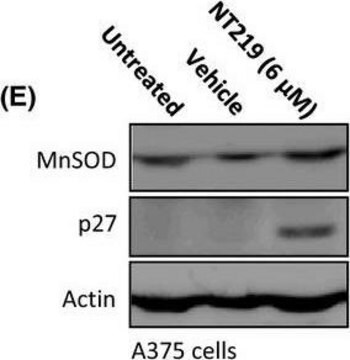S1450
Anti-Superoxide Dismutase (MnSOD) (DD-17)−Cy3 antibody produced in rabbit
1-2 mg/mL, affinity isolated antibody, buffered aqueous solution
Sinónimos:
Anti-IPO-B, Anti-Indophenoloxidase B, Anti-MNSOD, Anti-Manganese Superoxide Dismutase 2, Anti-Manganese dependent SOD, Anti-Mitochondrial SOD, Anti-SOD2, Anti-Superoxide dismutase 2
About This Item
Productos recomendados
biological source
rabbit
conjugate
CY3 conjugate
antibody form
affinity isolated antibody
antibody product type
primary antibodies
clone
polyclonal
form
buffered aqueous solution
species reactivity
human, rat, mouse
packaging
antibody small pack of 25 μL
concentration
1-2 mg/mL
technique(s)
direct immunofluorescence: 2-5 μg/mL using human HeLa, rat NRK and mouse 3T3 cells.
UniProt accession no.
shipped in
dry ice
storage temp.
−20°C
target post-translational modification
unmodified
Gene Information
human ... SOD2(6648)
Categorías relacionadas
General description
Immunogen
Application
Biochem/physiol Actions
Physical form
Disclaimer
¿No encuentra el producto adecuado?
Pruebe nuestro Herramienta de selección de productos.
Related product
Storage Class
10 - Combustible liquids
flash_point_f
Not applicable
flash_point_c
Not applicable
Certificados de análisis (COA)
Busque Certificados de análisis (COA) introduciendo el número de lote del producto. Los números de lote se encuentran en la etiqueta del producto después de las palabras «Lot» o «Batch»
¿Ya tiene este producto?
Encuentre la documentación para los productos que ha comprado recientemente en la Biblioteca de documentos.
Nuestro equipo de científicos tiene experiencia en todas las áreas de investigación: Ciencias de la vida, Ciencia de los materiales, Síntesis química, Cromatografía, Analítica y muchas otras.
Póngase en contacto con el Servicio técnico




